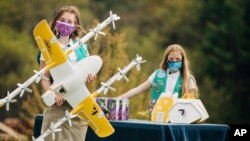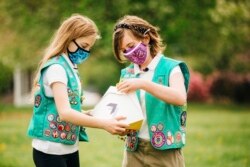The Girl Scouts organization, founded in 1912, is well known for teaching important life and survival skills to girls.
Part of their goal, as stated on their website, is “to improve their corner of the world.” One way they do that has become a beloved tradition. They sell Girl Scout cookies!
Many people look forward to Girl Scout cookie season and have a favorite cookie.
Girl Scouts usually sell their cookies in person: door-to-door, in offices and businesses, on busy street corners and sidewalks. But the coronavirus pandemic has made selling the cookies harder. There are simply less people out in public.
Well, this year in one U.S. state some Girl Scouts will get around that face-to-face problem. Their cookies will be delivered by drones.
Google is using drones to deliver Girl Scout cookies to people’s homes in a Virginia community. The town of Christiansburg has been a testing ground for delivery drones. The tests are operated by Wing, a division of Google’s corporate parent Alphabet.
Representatives from Wing told the Associated Press (AP) that the company began talking to local Girl Scout troops because of the pandemic. The troops have been having a harder time selling cookies during the pandemic because of restrictions.
Gracie Walker is an 11-year-old with Girl Scouts of Virginia Skyline Troop 224. Gracie told the AP that she is “excited” to be “part of history.” She says the drones “look like a helicopter but also a plane.”
Wing drones fly without a human pilot controlling them remotely. When a drone reaches the home, it drops the delivery on the front lawn.
Wing is also using the beloved Girl Scout cookies to build public support for drone delivery. The company is currently competing against Walmart, Amazon and others business.
However, there is not much evidence that people really want drone delivery services.
Amazon has also been working on drone delivery for years. In 2013, Amazon founder Jeff Bezos said in a TV interview that drones would be flying to customers' homes within five years. However, that date has long since passed.
A small study of people in Christiansburg appears to show that they are happy with the drones. But that study was done by researchers at nearby Virginia Polytechnic Institute and State University (Virginia Tech). Also Wing helped to pay for the study.
Lee Vinsel is an assistant professor at Virginia Tech and did the study. He said that neighborhoods in the area are “easiest for drone delivery.” That might not be the case for more crowded places, he added.
Federal officials started announcing new rules in early April. These new rules will allow operators to fly small drones over people and at night. Most drones will need to be equipped so they can be identified remotely by law enforcement officials.
But all these problems have not lessened Gracie’s drone delivery excitement. The Virginia Girl Scout said she hopes that people are going to realize drones are better for the environment.
And she adds, people can also just walk outside in their pajamas and get cookies.
I’m Anna Matteo.
Matt O’Brien wrote this story for the Associated Press. AP Retail Writer Joseph Pisani in New York contributed to this story. Anna Matteo adapted it for VOA Learning English. Susan Shand was the editor.
___________________________________________________________
Words in This Story
cookie – n. a sweet baked food that is usually small, flat, and round and is made from flour and sugar
corner – n. the place where two streets or roads meet
drone – n. an uncrewed aircraft or ship guided by remote control or onboard computers
delivery – n. the transfer of something from one place or person to another
troops - n. the basic organizational unit of Boy Scouts or Girl Scouts under an adult leader
remotely - adj. technical : from a distance
front lawn - n. an area in front of a house
pajamas - n. a loose usually two-piece lightweight suit designed especially for sleeping or lounging
customer - n. someone who buys goods or services from a business






